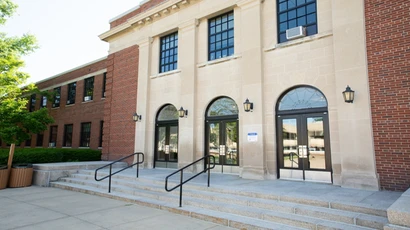
Consensual Intimate Relations Policy
Policy on Consensual, Intimate Relations
Between University Personnel and Students
Printer friendly formats: ![]() PDF (30 KB)
PDF (30 KB)
Mutual trust, confidence, and professional ethics must guide interactions between campus personnel as professionals and students at Fredonia. As professionals, we must always strive to be objective, unbiased, and scrupulously fair in our interactions with and evaluations of our students.
Anything a university professional does that may raise questions about his or her ability to be objective, unbiased and scrupulously fair in his/her interactions with and evaluations of students is a serious matter. Actions that jeopardize one's ability to convincingly make the claim that he/she can be objective, unbiased, and scrupulously fair or that make it possible that he/she will be perceived as possibly not having acted in such a manner, threaten to erode the mutual trust and confidence we must have in our interactions with one another.
In an effort to delineate professionally appropriate behavior and to foster mutual trust and confidence in our interactions with our students, the College Senate developed guidelines on intimate consensual relationships between university personnel and our students.
Definitions
- University personnel include all faculty, staff, administrators, teaching assistants, residence directors, and other university employees who have any authority over students.
- A position of authority includes situations in which one makes or is responsible for an evaluation of a student for admission, coursework, employment, promotion, financial aid, grants, research funding, recognition, suspension, expulsion, or other discipline.
- Students are all full- or part-time students.
- An intimate consensual relationship is any romantic and/or sexual bond. This relationship is normally distinct from those defined under the guidelines regarding sexual harassment.
Guidelines
- It is the sense of the faculty through its College Senate that intimate consensual relationships between university personnel and students create the potential for abuses of authority and for both actual and apparent conflicts of interest.
- University personnel should not participate in intimate consensual relationships without carefully considering the potential consequences to the student involved, to himself or herself, and to the university.
- Before entering into any intimate relationship with a student, university personnel have the responsibility to inform that student that such a relationship will limit their ability to direct work or promote that student's career, and may require that the relationship be revealed in any letter of recommendation written by such person.
- University personnel should not have or have had any intimate consensual relationship with any student currently enrolled in any of their courses.
- University personnel with administrative responsibilities should not engage in any intimate consensual relationship with any student over whom they have or have had authority, whether directly or indirectly.
- University personnel should not employ as a research or teaching assistant any student with whom they have or have had an intimate consensual relationship.
- University personnel should not participate in any decision pertaining to honors, degrees or discipline concerning any student with whom they have or have had an intimate consensual relationship.
Procedures
It is the obligation of any university personnel who have or who have had an intimate consensual relationship with a student to immediately terminate any position of authority with respect to that student and to avoid being in any position of authority with respect to that student in the future.
Upon request, the supervisors of such university personnel will assist in making any necessary arrangements to terminate the position of authority in question and to assure that such a position will not occur in the future.
Noncompliance with Policy
Any credible allegation that any university personnel have failed to avoid or to terminate a position of authority while having had or currently having any intimate consensual relationship with a student obligates the individual's supervisor (or an appropriate designee) to conduct a prompt, thorough, balanced and scrupulously fair inquiry to determine whether the allegation is true. For an investigation to be pursued, the allegation must not be anonymous.
During the investigation, the supervisor (or an appropriate designee) must meet separately with the student and also with the staff member. Those meetings must be at a time which is mutually convenient to the supervisor (or designee) and the person being questioned. When the supervisor calls for the meeting, the person being questioned must be informed of the reason for the meeting. He or she must be advised that they may have a person of their own choosing also attend with them, except that the person cannot be that person with whom there may or may not have been the consensual relationship in question.
Where it is verified that a position of authority in an intimate consensual relationship has existed or exists and the subordinate and/or the student involved refuse(d/s) to terminate the position of authority, the supervisor will terminate the position of authority.
Sanctions
Persons who have knowingly abused their professional authority in violation of these guidelines may be subject to a range of sanctions as specified in the appropriate collective bargaining agreement. All rights and procedures of the appropriate collective bargaining agreements and the campus handbook apply in the enforcement of the sanctions under these guidelines.
At the same time, it is essential that university personnel be protected from false allegations that an intimate consensual relationship exists that overlaps with a position of authority. Supervisors investigating any allegation of such a relationship are obliged to report anyone who knowingly makes such a false allegation. False reporting may be subject to sanctions that can range from verbal warnings to dismissal or termination. All rights and procedures of the appropriate collective bargaining agreements and the campus handbook apply in the enforcement of these guidelines.
August 2004
